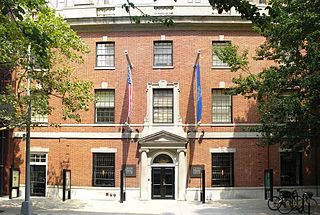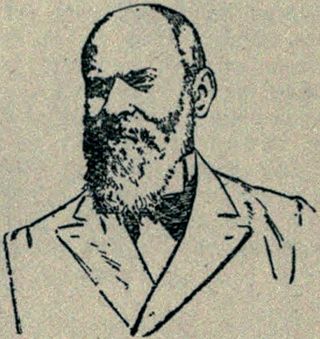Related Research Articles

Litvaks or Lita'im are Jews with roots in the territory of the former Grand Duchy of Lithuania. The term is sometimes used to cover all Haredi Jews who follow an Ashkenazi, non-Hasidic style of life and learning, whatever their ethnic background. The area where Litvaks lived is referred to in Yiddish as ליטעLite, hence the Hebrew term Lita'im.

YIVO is an organization that preserves, studies, and teaches the cultural history of Jewish life throughout Eastern Europe, Germany, and Russia as well as orthography, lexicography, and other studies related to Yiddish. Established in 1925 in Wilno in the Second Polish Republic as the Yiddish Scientific Institute.
The Jewish Morning Journal was a Yiddish-language publication in New York from 1901 to 1971.

Shmuel Niger was a Yiddish writer, literary critic and historian and was one of the leading figures of Yiddish cultural work and Yiddishism in pre-revolution Russia.

Isaac ben Mordechai Rabinowitz, also known by the pen name Ish Kovno was a Russian-born Jewish poet and translator.
Aaron ben Tzvi Jonathanson was a Russian Hebrew writer and poet. He worked as a teacher in Vilna until about 1859, when he settled to Yanova. He corresponded with Isaac Erter; and Judah Leib Gordon, who was one of his pupils, remembered him with great affection and thought well of his poetry. Jonathanson was the author of Klei Shir, a collection of poems and epigrams.
Abraham Walt, better known by his pen name Abraham Liessin, was a Belarusian-born Jewish-American socialist activist, Yiddish poet, and newspaper editor.
Joseph Margoshes was a Galician-born Jewish-American Yiddish journalist.
Jacob Rombro, better known by his pen name Philip Krantz, was a Russian-born Jewish-American socialist, newspaper editor, and Yiddish writer.
Samuel Margoshes was a Galician-born Jewish-American Yiddish journalist, newspaper editor, and Zionist.
John Paley was a Russian-born American Yiddish writer and newspaper editor.
Jacob Adler, also known by his pen name B. Kovner, was a native of Austria-Hungary and a Galician Jew who became a Yiddish language writer, poet, and humorist in the United States.

Zvi Hirsch Masliansky was a Belarusian-born American rabbi, lecturer, and Zionist.

Jacob Fishman was a Polish-born Jewish American Yiddish newspaper editor and Zionist.

Gershom Bader was a Jewish Galician-American writer, journalist, and playwright who wrote in Hebrew and Yiddish.
Abner Tannenbaum was a Russian-born Jewish-American Yiddish writer and journalist.
Bernard Chaimovich Gorin was a Russian-born Jewish-American Yiddish playwright, journalist, and translator.
Aaron Zucker, better known by his pen name A. Lutzky, was a Ukrainian-born Jewish American Yiddish poet.
David Moses Hermalin was a Romanian-born Jewish American Yiddish writer, journalist, newspaper editor, and playwright.
Bertha Wiernik was a Lithuanian-born American writer who wrote for Jewish publications in English and Yiddish.
References
- 1 2 "Peter Wiernik, 70, Noted Editor, Dies" (PDF). The New York Times . Vol. LXXXV, no. 28509. New York, N.Y. 13 February 1936. p. 19.
- ↑ Adler, Cyrus; Szold, Henrietta, eds. (1904). "Biographical Sketches of Jews Prominent in the Professions, Etc., in the United States". The American Jewish Year Book, 5665, September 10, 1904, to September 29, 1905. Philadelphia, P.A.: The Jewish Publication Society of America. p. 206 – via Google Books.
- ↑ Kohn, Roger. "Bertha Wiernik". Jewish Women's Archive . Retrieved 2021-10-27.
- ↑ Fogel, Joshua (2016-06-14). "Perets Vyernik (Peter Wiernik)". Yiddish Leksikon. Retrieved 2021-10-27.
- ↑ Landman, Isaac, ed. (1943). The Universal Jewish Encyclopedia. Vol. 10. New York, N.Y.: The Universal Jewish Encyclopedia, Inc. p. 516 – via Google Books.
- ↑ "Wiernik, Peter". The Jewish Encyclopedia . Retrieved 2021-10-27.
- ↑ "Wiernik, Peter". Encyclopedia.com . Retrieved 2021-10-27.
- ↑ Who's Who in American Jewry, 1926. New York, N.Y.: The Jewish Biographical Bureau, Inc. 1927. p. 647 – via Google Books.
- ↑ "400 Attend Service for Peter Wiernik" (PDF). The New York Times . Vol. LXXXV, no. 28511. New York, N.Y. 15 February 1936. p. 15.